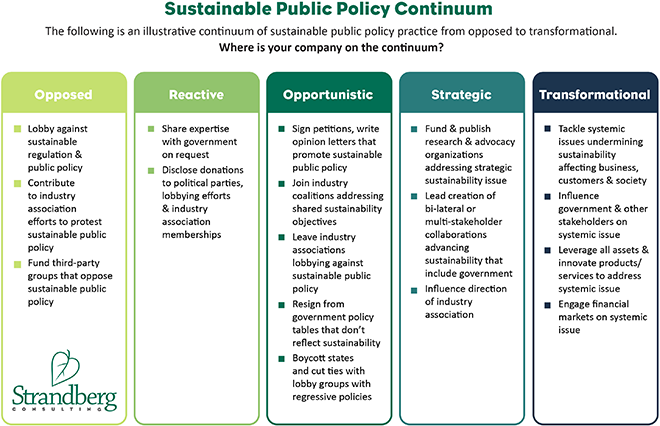Increasingly, businesses are using their clout to influence governments to advance a fair, inclusive and sustainable society and position their business for success. They recognize that government leadership is essential to develop progressive economic, social and environmental public policy to realize a future in which business and society can prosper.
Marks & Spencer, the huge UK retailer, captures that commitment in black and white in its “Advocacy” commitment: “Public policy can set guiding principles and general direction, offer incentives, and prompt legislation to make change easier. Conversely, it can provide obstacles to a better future. It’s important that pro-sustainability businesses speak out and take action to influence public policy and practice in ways that result in stronger sustainability outcomes.”
Leading companies understand this and actively engage with policy makers and regulators to create the context to achieve their sustainability goals and build a strong foundation for societal well-being and business health. Transformational companies advocate for good to inform and advance the policies needed to support a stable local and global economy and sustainable society. One of these leading companies is profiled below.
The Co-operators: advocates for sustainability in policy and action
The Co-operators, a large multi-line insurance company based in Canada, created an advocacy policy that sets the terms for proactive engagement with government to create the enabling conditions to improve prospects for its business, customers and society. Further, they adopted a 10-year advocacy goal to 2022, called “Our Public Voice.” It reads, “We are strong and effective public advocates for sustainability and inspire others to take action.” The company set targets to influence government on building code changes to address wind storms and flooding; mandatory installation of fire sprinklers in new homes and residential care facilities; mandatory installation of carbon monoxide detectors in all homes; and increased access to safe cycling in communities. And they are making progress. For example, the Ontario government announced a few years ago that all care homes for seniors, people with disabilities and vulnerable Ontarians will be retrofitted with fire sprinklers.
The company continues its advocacy efforts along a well-articulated path. Some of The Co-operators’ key initiatives follow:
Join and establish industry coalitions
Five years ago, the CEO became a founding member of the Council for Clean Capitalism — a group of influential CEOs with a mandate to advocate for policy changes and to create an economic model in which what is good for business is good for the environment and society. They have successfully lobbied governments on green bonds and other measures.
Publish research and create multi-stakeholder collaborations
As Canada was the only G8 country without overland flood insurance, The Co-operators committed to initiating industry and government dialogue on this gap to help Canadian home owners protect themselves from flood damage. They commissioned and published academic research on the issue which called for a multi-stakeholder approach. The company then held an industry and government roundtable to pursue solutions, publishing another report summarizing the dialogue. This evolved into a multi-stakeholder collaboration, called Partners For Action, that was officially established at the University of Waterloo to continue the thought leadership and public policy engagement.
Influence financial markets and write opinion letters
To influence financial markets on systemic sustainability issues, the CEO at the time joined the advisory council of the United Nations Environment Program’s “Inquiry into the Design of a Sustainable Financial System.” Among other efforts, she wrote an opinion letter to the country’s national newspaper, the Globe and Mail, calling for the federal government to create a roadmap to ensure the financial system serves the needs of Canadians. In part, it read, “The [global financial] system must be assessed and modernized to adjust to complex global pressures, so it can promote more forward-looking investment, innovation and sustainable prosperity.”
The Co-operators leads the charge on opportunistic, strategic and transformational sustainable public policy. Near future plans include taking policy action on mental health issues, benefiting Canadians and its health insurance business line. The graphic below captures the spectrum of sustainable public policy practices. Can you draw inspiration from transformational companies like The Co-operators in your own company’s efforts?



